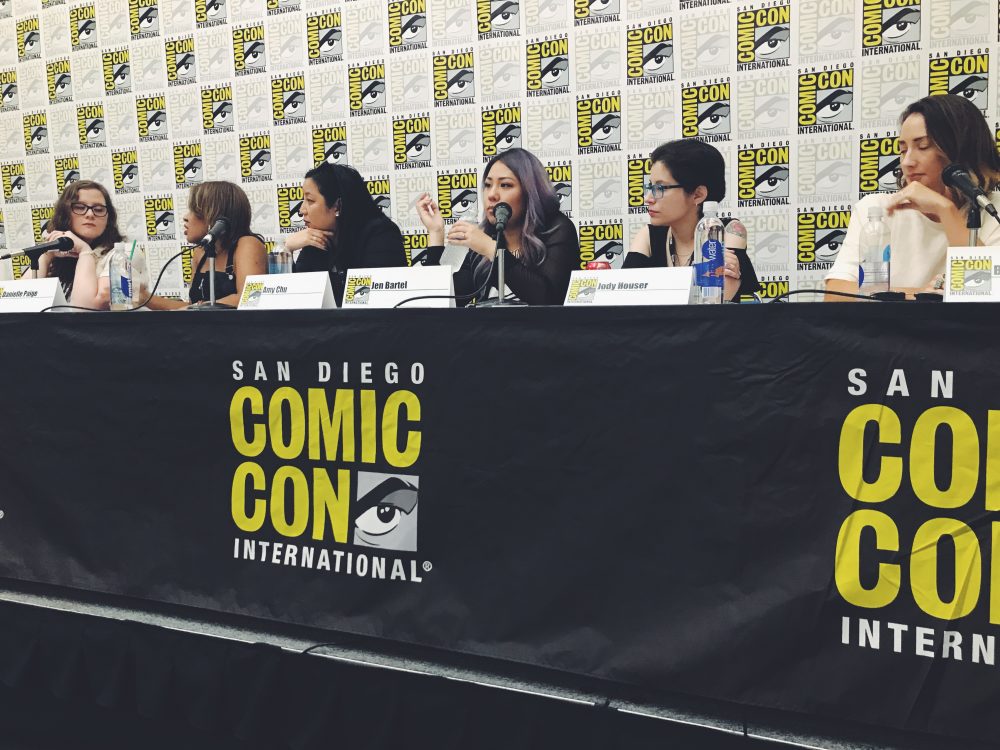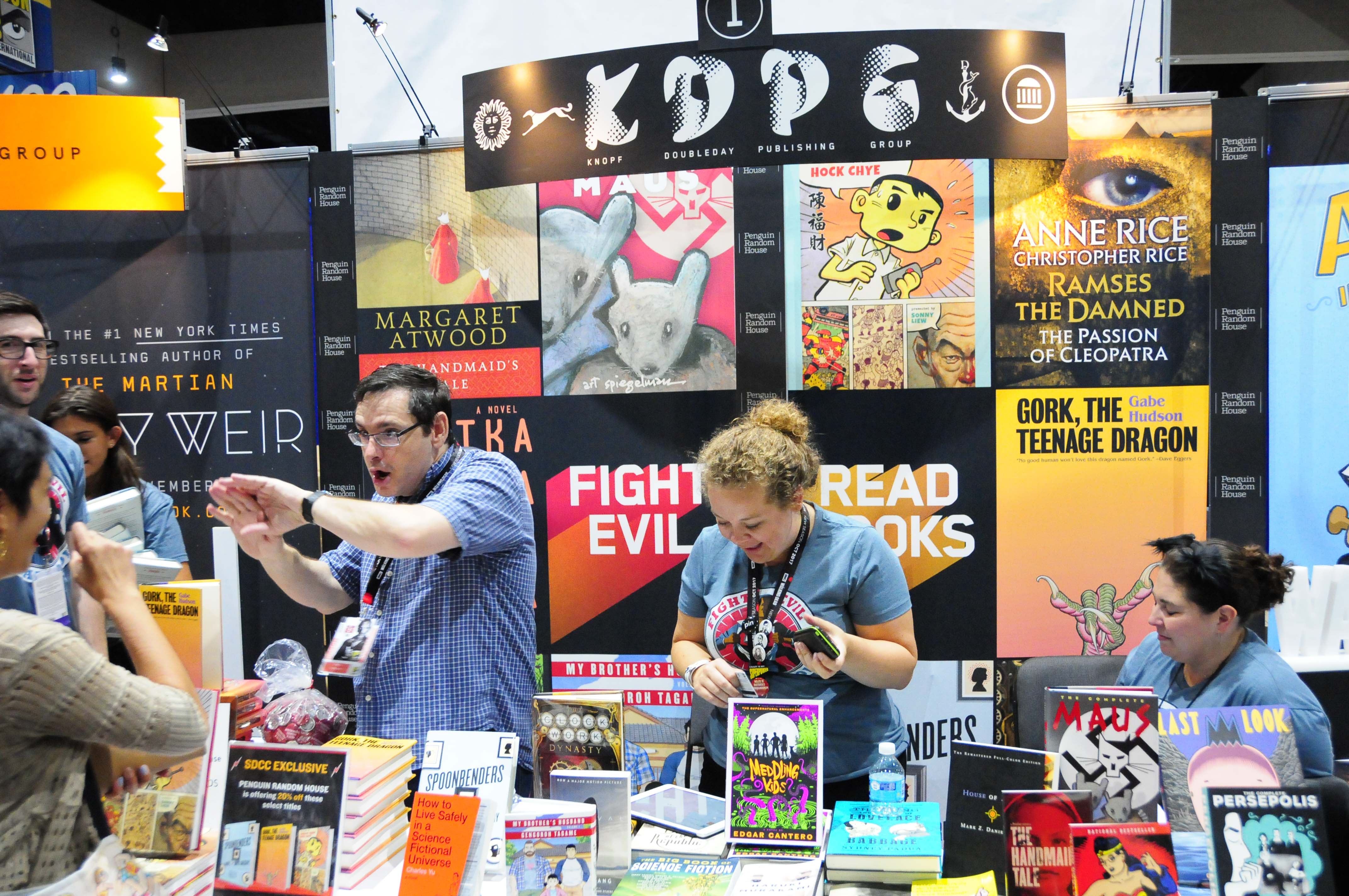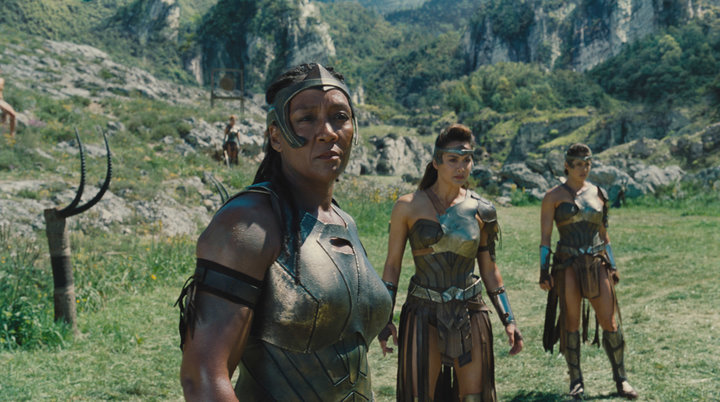By Andrea Ayres
The strong female archetype is one people have an almost reflexive awareness of, the character of Wonder Woman springs to mind as an obvious example. Movies like Elektra (2005) or Catwoman (2004) exhibit the stereotypical strong female character well. It’s someone who may possess physical strength or agility but that’s about it in terms of their character’s development. The end result is a character who doesn’t feel fully realized, realistic, or relatable. That’s why Sam Maggs (Bioware) and Amy S. Foster (The Rift Uprising) put together a panel on how to move beyond simple presentations of strength into more fully realized projections of women.
Actress Bree Turner (Rosalee, Grimm) joined the panel to talk about what it’s like being an actress in an industry who often defines strength using masculine characteristics. In order for women characters to be seen as strong, they often have to take on often male ascribed traits to prove their value. Turner says she chose to play the character of Rosalee as someone who wasn’t only aggressive or hardened but took into consideration all of what it means to be a woman. That meant displaying empathy, joy, and not shying away from her sexuality.
Many on the panel were encouraged by Wonder Woman and its depiction of female warriors. For Alicia Lutes (Nerdist) showing different characters wrestling with and learning to accept and their own strength and power was a poignant moment.
Sam Maggs asked the panel to address the issue of the one-dimensional nature of strong female characters. When it comes to representations of women of color within pop culture media there are additional challenges. Jen Bartel briefly discussed some of these challenges and how she feels the industry is beginning to move away from tokenism. “Within any marginalized group there is so much pressure to portray them as perfect all the time and only representing the best of. I think now we are seeing a shift where people are wanting to see their flaws represented too. I’m seeing more imperfections represented and I think that’s really cool.”
Author of Dorothy Must Die Danielle Paige says the reluctant hero has always made more sense to her. Characters like Katniss Everdeen from The Hunger Games tend to resonate with her more because she’s not the person who’s going to run into a burning building. It’s displaying more vulnerability that strikes Paige as distinctive.
As a writer, Amy Chu believes it’s important to flip the narrative on male character tropes as well as female characters. She does so by anticipating what readers expect from established characters like Poison Ivy and Red Sonja and putting a twist on it. “It’s not that hard to make a character who is supposed to be smart, smart. And readers see that and they think, ‘Oh that’s novel.’ Well, yah she’s a scientist and has a PhD.”
Panelists agreed that seeing women who are smart and who are able to own their intelligence and command conversations is a rarity. Portraying characters who can be flawed and strong, who are able to have dualities is part of how pop culture can move beyond one dimensional characters. Turner says of her character Rosalee, “I was allowed to be everything, which means I was allowed to be a full human being.”
Too many women characters in popular culture are only able to realize their strength or display growth as the result of experiencing trauma. Often this trauma only serves to further the plotline of a male character and that’s problematic for author Amy S. Foster. Foster wondered who should get to tell stories of trauma and specifically considered the portrayal of domestic violence on the television series Big Little Lies.
The mini-series stars Nicole Kidman as Celeste Wright, a woman coming to the realization of the abusive nature of her marriage to husband Perry Wright played by Alexander Skarsgård. Foster says of the show, “Although I found it compelling, I also found it really disturbing and not in a good way, is this kind of sexual and violent material appropriate? Is it entertainment?”
Paige notes that when it comes to depicting violence or trauma it’s perhaps less about the depiction and more about the fallout of what happens. “If a women’s rape is a vehicle for a guy’s growth, then that’s a problem.”
The question here is really who gets to tell women’s stories and how can we be sure that the way these stories are told are authentic and not voyeuristic. Lutes thinks the way the series Orphan Black was written, produced, and directed serves as a good example of how men can be allies within the space of telling women’s stories. “We need male allies in this space to help raise women up and show them (male allies) that it is okay to be vulnerable and be unsure, and be able to ask women for help when they don’t know something.”
Each of the panelists stressed the importance of being able to admit to the flaws of certain shows, like Game of Thrones. Whose problematic depictions of race and sexual violence are both troubling to fan Lutes. “The main character is Khaleesi who is the epitome of white privilege, she had eggs given to her and then she flies off on her white privilege.”
It’s okay to like something and wish it was better. It’s okay, the panelists say, to demand change and progress. As fans and consumers it’s our job to hold ourselves accountable for the material we watch but also the creators of that material. Having conversations about how to improve pop culture representations of women is how we ensure growth and progress occurs. Though the panelists note that at times these conversations may be painful, they are always necessary.








